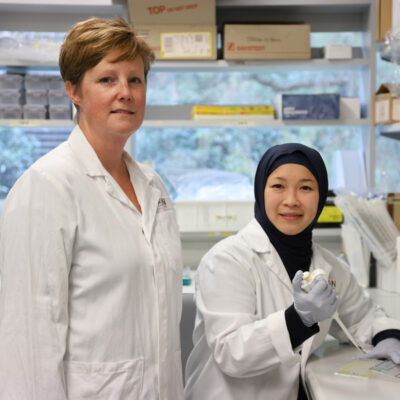Targeting viral lung infections two ways
By Rob Clancy, staff writer
A new anti-viral drug to target the cause of viral lung infections and the infection itself, could be a game-changer in treating severe influenza.

There are currently few effective drugs available to treat severe viral lung infections, which can be fatal when our body’s immune system overacts.
Associate Professor Michelle Tate, from Hudson Institute’s Viral Immunity and Immunopathology Research group, is working with Lateral Pharma Pty Ltd, developing drugs to treat severe lung infections including influenza and the common cold.
“New drugs which dampen damaging inflammation and reduce the impact of respiratory viral infections are desperately needed,” A/Prof Tate said.
Finding new influenza drugs
“Each year in Australia on average there are around 3,500 deaths linked to flu and 18,000 hospitalisations,” she said. “When patients with severe flu are admitted to hospital there are no effective drugs available to reduce the response to the virus.”
Lateral Pharma CEO, David Kenley OAM said there is a clear need for new antiviral and anti-inflammatory drugs.
“They are needed for the treatment of a number of significant conditions caused by viruses which are not at present adequately controlled, including upper and lower respiratory tract infections and influenza,” he said. “This need is particularly prevalent in the elderly, where death rates from viral attack are higher.”
Viral infections replicate when the virus infects its host by attaching to the host cells. While current antiviral treatments target the virus itself, these drugs target the host cell, using naturally derived protective proteins to fight the virus and stop it replicating.
Anti-inflammatory and anti-viral efficacy
Already A/Prof Tate and her team have shown that these drugs display both anti-inflammatory and anti-viral efficacy in preclinical models.
To bring them to patients, the team is performing critical ‘proof of concept’ and mechanistic studies in influenza and respiratory syncytial virus models, with the view to developing new drugs.
“These drugs have been shown to be safe in humans and our studies will facilitate the design of a clinical trial and translation into the clinic,” A/Prof Tate said.
Funders | Lateral Pharma Pty Ltd
Contact us
Hudson Institute communications
t: + 61 3 8572 2761
e: communications@hudson.org.au
In this article
About Hudson Institute
Hudson Institute’ s research programs deliver in three areas of medical need – inflammation, cancer, women’s and newborn health. More
Hudson News
Get the inside view on discoveries and patient stories
“Thank you Hudson Institute researchers. Your work brings such hope to all women with ovarian cancer knowing that potentially women in the future won't have to go through what we have!”






